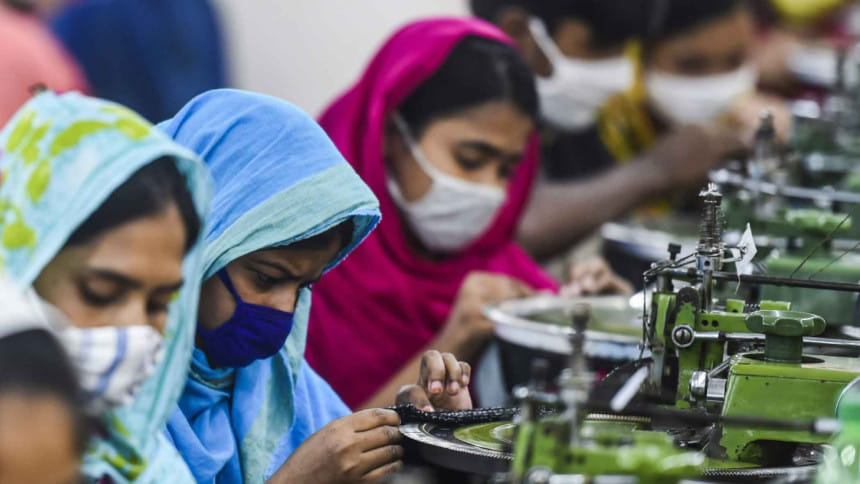Let’s capitalise on the booming RMG business

Two years ago, garment order books were empty as Covid broke out and shut down the main global markets for Bangladesh. Two years on, those order books are full. Our ready-made garment (RMG) industry has come full circle, following what we will surely look back upon one day as one of the most extraordinary periods in our history.
Nobody knows how the next few months or years will pan out. There are talks of global inflation leading to higher interest rates, which will be required to put the brakes on rising prices. Higher interest rates often slow down the economy. Others think inflationary pressures might ease off on their own once the global supply chains begin to move properly and the bottlenecks clear up in major logistics hubs, such as China.
The picture of uncertainty prevails, but we must be grateful that, amid these volatile times, business is good. But what now? I think we have an opportunity that we should not allow to go to waste. Bangladesh must strike while the iron is hot and capitalise on healthy order books by making investments and changes that will serve us well in years to come.
Somebody asked me just recently about how I think the next 12-18 months would go. That is anyone's guess. That said, our business has been fairly robust since late last year, and I don't see why this would change anytime soon. The reason I say this with a fair degree of confidence is China, the world's largest textile market, which has adopted a "zero Covid" strategy, closing down whole cities due to a small number of infections.
These issues have major implications for Bangladesh. Our own government has taken a light-touch approach to the pandemic, balancing the need for public health safety with the necessity of having a healthy economy. China continues down its path of zero Covid, which shows no sign of being discontinued.
The upshot of all this is that China is becoming a serious sourcing risk for all retailers, including those in fashion. When people ask how I see the near-future unfolding, it is difficult not to see a further decoupling between China and fashion brands and retailers, and more business for its closest rivals, such as Bangladesh.
So it is high time now for our garment suppliers to take steps and turn this short-term opportunity into a long-term business strategy. The sun won't shine forever on our industry, and there are steps we can take to capitalise on the healthy revenue streams we are experiencing right now. We must not waste this opportunity.
Investment in key, business-critical areas is a must-do for our industry in the next 12-18 months.
The first of these areas is technological upgrading in our factories. Productivity rates remain low in our industry compared to that of our rivals. Better operational management, better layout, more modern machinery—all these can enable us to improve productivity and bottom lines. They can also ensure that we continue to meet customer requirements and be more flexible to changes in orders.
Another factor is training manpower. Good people make a successful business. Attracting decent talent is a huge challenge at any time, particularly when order books are full to the brim. Now is the time to invest in people and their training, and to forge stronger links with our colleges and universities.
The third point is, of course, sustainability. One thing I have witnessed this past year is that our customers are doubling down on their demand for sustainability now more than ever. We are seeing big fashion retailers rationalising their supply bases, getting rid of suppliers that cannot meet their criteria for sustainable production. Some of our factories risk being left behind in the new landscape if they don't invest in, for instance, energy and water-saving technologies.
The final area I believe we need to focus on is promotion and marketing. I see so much interest in Bangladeshi products right now, there is such a huge groundswell of goodwill towards our industry. Fashion brands saw during the pandemic that we can be relied upon as a trusted sourcing partner, and I now believe we are reaping the rewards of that.
Let's not waste this goodwill, and let's all focus on the same key factors: quality, consistency and sustainability. Some people believe a shift of production from China to Bangladesh might be temporary. It's up to us to make sure this is a permanent shift, and for that, we need to invest.
Mostafiz Uddin is the managing director of Denim Expert Limited. He is also the founder and CEO of Bangladesh Denim Expo and Bangladesh Apparel Exchange (BAE).

 For all latest news, follow The Daily Star's Google News channel.
For all latest news, follow The Daily Star's Google News channel. 



Comments